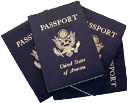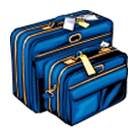Links to Remember
Airport Safety, Duties and Customs
In this section, you will find information on how to check for new updates and stricter requirements now enforced by airports and airlines. There are some basic restrictions regarding what you can and cannot bring back from Australia into the United States. You will also learn how to keep a better watch on your luggage so that no one else can tamper with it.
No matter the country from which you are departing or entering, it is important to understand airport and airline safety and security, remembering to cooperate with airport, airline and customs officials.
1. Airport Safety and Security

- Showing Identification: Try to always have your passport easily accessible, yet protect it against theft. Be prepared to show your passport when presenting your airline tickets/receiving boarding passes, entering departure gates, going through passport control, when boarding flights, etc.

- Carry–on Luggage: Check with your airline to find out its regulations for what you can and cannot pack in your carry–on bags. Do not put any sharp objects like nail scissors, razors, or pocket knives in your carry–on. Such items may be considered a threat to safety and could be taken away from you. Pack them in your checked baggage instead.
- Accepting Things from Others: Under no circumstances, should you ever take anything from, or hold anything for, anyone who asks you to do so. If anyone does ask you, simply say "no" and walk away. Don't be afraid to say "no" to family and friends. You need to think about the potential consequences before you hold anything for anyone.
- Watching Your Bags: Your bags should be in your sight at the airport up to point when you check them at the airline counter. Once you have picked up your bags from baggage claim, and are on your way to customs, be sure to keep a close eye on all your luggage so that no one but you has access to it.

- Random Baggage Searches: If you are stopped and asked to open your luggage, cooperate with the customs officials. Customs officials often conduct random baggage searches; just because your luggage gets searched, doesn't mean you have done something wrong.
- Body Searches: Airport security officials may conduct random body searches using an electronic device they wave over you. In some cases, a security official of the same sex as you may conduct a body search using his or her hands, and/or ask you to remove your shoes for inspection.
- Distractions: Airports are full of people carrying cash, travelers' checks, credit cards, passports and other valuable documents. Therefore, airports tend to be an active place for thieves. While your attention is focused on checking in, boarding, getting your bags, finding a restroom, etc., you can become an easy target for theft. Be alert to anyone who suspiciously tries to distract you by asking directions, knocking over your coffee, reaching under a bathroom stall, etc.
2. Duties and Customs Declarations
Customs control regulations may affect what you can and cannot bring in and out of Australia. Following the events of September 1, 2001, US airport and customs security has become much stricter, leading to long waits prior to boarding your plane, body searches, a necessary early arrival time and questions from officials in both countries. Remember to be patient and be honest when answering all officials' questions. The following information from the U.S. Department of State discusses border issues in more depth. For more complete information on border and Environmental Affairs between the United States and Australia, please visit the U.S. Customs and Border Protections Agency.
- Clearing Customs: Follow the directions given to you by flight attendants and your program for the process of clearing customs.
- Declaration Forms: In most cases, you will be given a card to fill out that will require your passport information, items you have purchased in Australia and are bringing back into the country, and the cost of these items.
- Receipt of Purchase: Retain all receipts, or make an itemized list of purchases, prior to customs inspection.
- Taxes: If the total cost of your purchases exceeds a certain amount, you will be asked to pay a tax on all items over the allotted amount.
- Items You Cannot Bring Into the United States: The following is a general list of items that cannot be brought into the United States from Australia or from anywhere else:
- Plants, animals (especially those on lists of endangered species), and all live birds, unless you have a valid certificate or license from the U.S. Centers for Disease Control and Prevention (CDC).
- Drugs—even if a drug was legal in Australia or other countries, it may not be legal to bring it back to the United States. If you are carrying prescription drugs, it is important to have your prescription with you for proof. You may need to have your prescription officially translated into German.
- Firearms, knives, explosives, and gas canisters.
Remember to be patient and be honest when answering all border officials' questions
- Items You Can Bring Into the United States: There are limits on bringing in substances that are not illegal, such as alcohol or tobacco. Check with customs for updates on these legal quantities. Even if a minor can purchase alcohol and tobacco in Australia or other countries, he or she cannot bring these substances back into the United States.
- Smuggling: What may be legal in Australia and in other countries may not be legal in the United States, and vice versa. Smuggling can be a federal offense leading to fines or imprisonment.
3. Relevant Questions
- Do you have all of your identification and travel documents in an accessible, yet secure, location?
- What steps can you take to maximize your safety while at airports?
- Did you pack your bags yourself?
- Could anyone have tampered with, or put anything into your luggage before you checked your bags?
- Did you accept anything from anyone before boarding your flight?
- When should you fill out a duties and customs declaration form?
- Were you honest in declaring everything you are bringing into or out of the United States?
- How much have you spent on items you are bringing back into the U.S.?
- Will you have to declare items at border control or customs that exceed a certain value?
- Were you careful to avoid carrying any item that be considered illegal in the United States or the country of your choice, or may cause you to be suspected of smuggling?
- For your return trip, have you kept all documentation provided to you by your airline, and all countries to which you traveled (entry/exit verifications, etc...)?
- Does your airline have any new regulations about what items can be packed in carry–on luggage, and how many carry–on items you may have?
- Have you given yourself enough time to get to, and check–in, at the airport or at border checkpoints (pending any new airport/border safety regulations)?
4. Checklist
- I have all of my identification and travel documents in an assessable, yet secure, location.
- I did not accept anything from anyone before boarding my flight.
- I packed my bags myself and know exactly what's in them.
- My bags never left my sight or supervision before they were checked in.
- I filled out all necessary declaration forms.
- I was honest in declaring everything I am bringing into or out of the U.S.?
- I was careful to avoid carrying any item that be considered illegal in the U.S. or the country of your choice, or may cause me to be suspected of smuggling.
5. Resources
- GlobalScholar.us: Go to Course 1, Module 2, Task 5 "Required Documents" to learn about what you need to enter another country.
- GlobalScholar.us: Go to Course 2, Module 5, Task 7 – "Duties and Customs Regulations" to find information on how to check for new updates and stricter requirements now enforced by airports and airlines.
- HotelsTravel.com Provides links to major international airports worldwide.
- TimeAndDate.com Provides all time zones and running, up–to–date clocks for all capital cities.
- Transportation Security Administration Official government site providing security tips for air travelers
- U.S. Customs Information all travelers should know before they enter or leave the U.S.
- U.S. State Department: Bureau of Consular Affairs: Foreign Entry Requirements This site contains brief descriptions of entry requirements for several countries.
Student Handbook




 Australia
Australia


